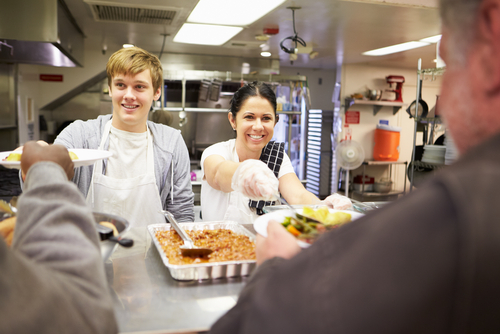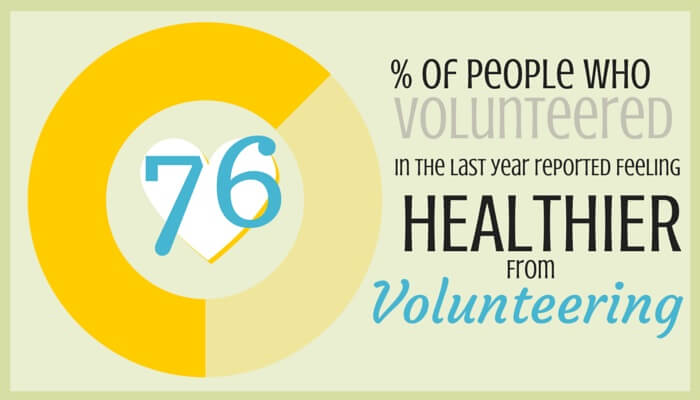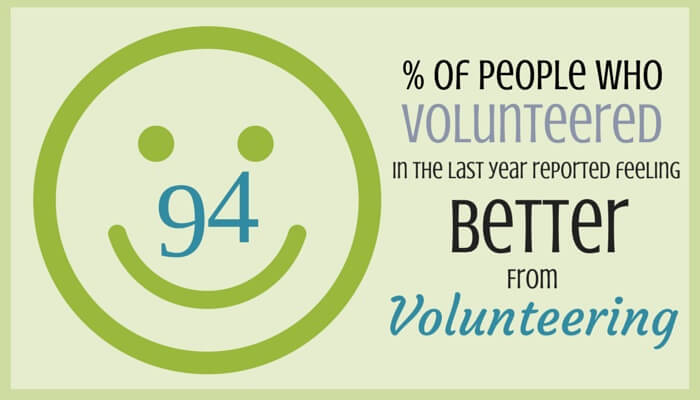Volunteering is alive and well in the United States. According to the U.S. Bureau of Labor Statistics, an estimated 62 million people in the U.S. volunteered from September 2013 to September 2014.
Doing good for others not only helps people in need but also the person donating his/her time! As per United Health Group‘s 2013 study, 94% of those who volunteered in the past year say that volunteering improves their mood and 76% claim that volunteering has made them healthier.
The experiences may be personally gratifying whether you’re spending time at a food pantry or providing meals for families on Thanksgiving. If you have volunteered before, you probably felt good about it, but have you ever stopped to think about why you felt that way?
The good feeling is likely the result of one (or more) of the below mentioned five factors being a good match with the type of social good work you are doing. While the primary goal of most volunteers is to help those in need, some self-awareness can help you get the most out of your experience.
Maximize Your Time as a Volunteer by Considering:
- Your Values
Volunteering for an organization that is aligned with your values is inspiring.
If an organization’s mission is aligned with your religious, environmental or other personal values, the experience instantly becomes more worthwhile. This extra motivation will keep you engaged and you’ll be more likely to volunteer again.
I’ve found this to be the case when I volunteer at a food pantry with a group from my church. We organize boxes of food, and it’s always fun to spend time with other members of my faith.
- Your Community
The opportunity to give back/be a part of your community can be fulfilling.
You can start with where you live by volunteering at local organizations, but you can also look for ways to strengthen your interpersonal community.
My good friend works for a nonprofit called ConKerr Cancer that sews fun pillowcases for children with cancer to use in their hospital rooms. In college, we would organize sewing sessions at my sorority house, and it was an incredible bonding experience.

- Your Time
Volunteering gives you a sense that you have more time.
This may seem counterintuitive; however, in “Volunteering Surprisingly Makes You Feel Like You Have More Free Time,” writer Jillian Berman cites a 2012 study in Psychological Science that shows volunteering can make people feel like they have more time. Helping students at a Brooklyn nonprofit has also been invaluable to her wellbeing.
- Your Career Goals
The skills garnered by volunteering can prepare you for your next career.
Relevant volunteer experience may be included on your resume, and volunteering can serve as a first step in connecting with companies that you might be interested in.
Volunteering may even spark a hidden desire to help others on a professional level. Some volunteers become so moved and inspired by their experiences that they change their career paths to become counselors or social workers.
- Your Self-Esteem/Confidence
When you help out, you feel better about yourself because you’re making a positive impact.
Volunteering helps put personal issues into perspective and shifts your focus from whatever negativity is going on in your personal life to the positive things you’re doing for your community.
In the past, my Mom and I have “adopted” families for Thanksgiving. We shop for the meal ingredients and then drop off the groceries to the families.
The experience always strikes a chord with me because it’s hard for me to imagine not having a traditional Thanksgiving dinner growing up. Meeting the families is a moving experience, and I’m aware of the spike in self-esteem that I feel.
Whether or not you volunteer for altruistic reasons or to help yourself, it’s a great thing to do! Volunteering helps everyone: those in need and the volunteer.
About the author: Megan Dottermusch is a content manager for SocialWork@Simmons, the innovative online MSW program offered through Simmons College. She is passionate about combating mental health stigmas and promoting wellness through proper nutrition, fitness, and everyday mindfulness.




I love that Megan is blogging about the benefits of volunteering! So many eager new graduates struggle with finding their first jobs in the field. Volunteering is not only a “feel good” practice, it also can yield concrete results.
My leadership skills were born out of my volunteer efforts through the American Cancer Society, my church involvement, Leadership Lambda, the Women’s Business Network, and other community efforts. Through those activities, I was able to receive formal and informal mentoring, take on tasks and responsibilities that built my confidence and my visibility in my community, and eventually run for formal positions of leadership. That, in turn, led to my own mentoring of young professionals.
Job opportunities that I have received throughout my life were most often manifested in large part directly from those volunteer activities. As my skills and confidence were strengthened, so were the opportunities that presented themselves. For those individuals struggling to get into the field, I would highly recommend giving volunteering in your community. The benefits are exponential. And, as Megan noted at the beginning of this post, committing to organizations (and tasks within those organizations) that feed your spirit and serve your needs as well as those of the organization will prove most beneficial.
Thanks so much for your kind words Tamara and for all the work you’ve done as a volunteer. It’s so true, volunteering in your community is a great way of entering into the social work field!